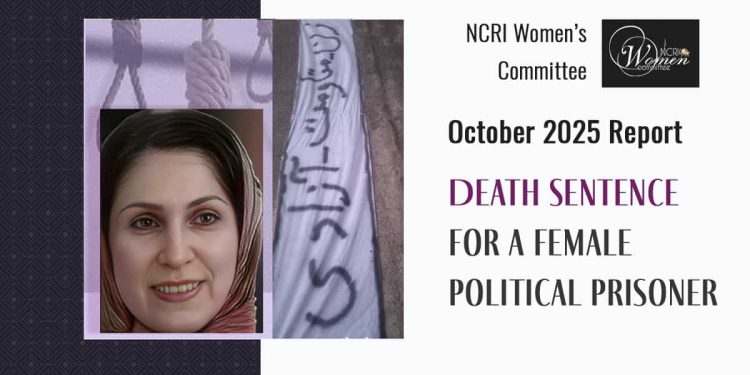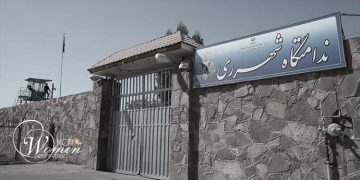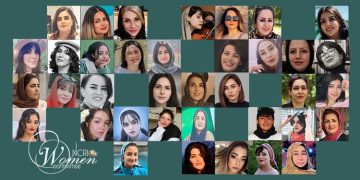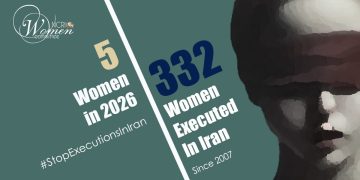The Resistance of Female Political Prisoners Inspires Iranian Women and Girls in Their Struggle Against the Regime of Executions and Massacre
October 2025 Report: Death Sentence for a Female Political Prisoner
With the unprecedented execution of nearly 300 prisoners in Iran, October 2025 has gone down as the bloodiest month in the country’s last 36 years. Among those executed were at least seven women, marking one of the highest monthly figures for women’s executions in Iran since the 1980s.
This wave of executions reflects the fear and desperation of a regime besieged by multiple political and economic crises, unable to offer any solution to mounting public discontent, and striving instead to stave off an inevitable uprising that could bring about its downfall.
In this context, during the final days of October, the clerical regime took an unprecedented step by issuing a death sentence for a female political prisoner, Zahra Shahbaz Tabari, a supporter of the People’s Mojahedin Organization of Iran (PMOI/MEK).
For the regime, execution is a means of survival. Another, more insidious method of killing prisoners is through medical neglect and deliberate denial of treatment in prisons that lack even the most basic healthcare and sanitary conditions, falling far below international standards. In late September, at least three female prisoners, including political prisoner Somayeh Rashidi in the notorious Qarchak Prison, and another woman in Fardis Prison, lost their lives due to delayed medical care.
On the other side of the coin of repression and executions in October, the steadfast resistance of prisoners reached unprecedented dimensions. From protests and sit-ins denouncing the deaths of fellow inmates and demanding the transfer of women political prisoners from Qarchak to Evin Prison, to the seven-day hunger strike of 1,500 death-row prisoners in Ghezel Hesar Prison in Karaj, and the “Tuesdays against Executions” campaign, along with the demonstrations by families of death-row prisoners, all these acts of defiance entered a new phase of momentum and achieved remarkable results during this month.
Political Prisoner Zahra Shahbaz Tabari Sentenced to Death
On October 25, reports emerged that Zahra Shahbaz Tabari, a 67-year-old political prisoner, had been sentenced to death by Branch 1 of the Revolutionary Court in Rasht. The charge brought against her was “supporting the People’s Mojahedin Organization of Iran (PMOI/MEK).”

This marks the first time that a woman supporter of the PMOI has received a death sentence, a blatant attempt by the regime to intimidate Iranian women, who stand at the forefront of protests and uprisings, and to deter them from joining the organized opposition seeking the regime’s overthrow.
According to Ms. Tabari’s family, her court session was held online the previous week and lasted less than ten minutes. During the hearing, the court-appointed lawyer made no effective defense, and the death sentence was issued immediately. The so-called “evidence” in her case consisted only of a piece of fabric bearing the slogan “Woman, Resistance, Freedom” and an unpublished audio message, which her family has denounced as baseless and fabricated.
Ms. Zahra Shahbaz Tabari holds a master’s degree in electrical engineering and is a graduate of Isfahan University of Technology and the University of Borås in Sweden, specializing in Sustainable Energy. She was arrested on April 17, 2025, when security forces stormed her home without presenting a warrant, and she is currently held in Lakan Prison in Rasht.
The Women’s Committee of the National Council of Resistance of Iran (NCRI) urges relevant United Nations bodies and all international human rights organizations to take immediate action to save the life of Zahra Shahbaz Tabari and other political prisoners sentenced to death.
Unjust Sentences and Legal Uncertainty for Female Political Prisoners
It should be noted that Fariba Khorram-Abadi, a political prisoner, professor of theology, and mother of one, who was arrested in August 2025 without any judicial warrant, was informed on October 23 that she had been sentenced to one and a half years in prison. She was charged with “propaganda against the regime” and “membership in anti-government networks.”
Ms. Khorram-Abadi, who has a history of heart attacks, is being held in Fardis Prison in Karaj under alarming conditions. She was given the wrong medication, causing severe neurological tremors and repeated seizures. Despite her critical condition, prison guards shackled her hands and feet while transferring her to the hospital, an act of humiliation that worsened her suffering. In protest of this degrading treatment, she refused to go to the hospital.
Manijeh Hassani-Fard, 62, a mother of two, has been detained in Fardis Prison since August 2025 without any judicial warrant or formal charges. No judicial or security agency has taken responsibility for her arrest, and no information has been provided regarding the reason for her detention, the authority handling her case, or her health condition.

Similarly, Yalda Emamdoust, a 50-year-old athlete and mother of two, has been detained since mid-August after security forces arrested her without a warrant and transferred her to an undisclosed location. So far, no information has emerged about her whereabouts or condition, and none of the judicial or security institutions have acknowledged responsibility for her arrest.
Women Executed in October
- Zeinab Khodabandeh – October 13
- Nahid Hemmati – October 15
- Kafieh Ghabadzadeh – October 15
- Saeedeh Khodadadi – October 22
- Narges Ahmadi – October 25
- Mahboubeh Jalali – October 25
- Katayoun Shamsi – October 29
A review of the cases of these women, executed after unfair trials and without access to legal defense, reveals that most were either victims of poverty or of discriminatory family laws, and many were convicted of killing their abusive husbands in acts of self-defense.
Political prisoner Golrokh Ebrahimi Iraee, in a letter dated July 27, 2019, after studying the cases of women sentenced to death for murder, wrote: “The majority had killed their husbands after years of enduring abusive and violent marriages, marked by insults, beatings, and at times torture, because divorce was impossible for them. They believed that if the judges had granted them divorce in response to their repeated complaints, they would never have resorted to such desperate acts.”
Resistance Against Executions: From Ghezel Hesar to the Streets of Tehran
The surge in executions has not silenced dissent; rather, the cry of “No to Executions” is echoing ever louder from the prisons to the streets. October witnessed an unprecedented act of defiance by death-row prisoners in resistance to the regime’s machinery of death.
Between October 13 and 19, 1,500 death-row inmates in Unit 2 of Ghezel Hesar Prison in Karaj launched a hunger strike to protest the rising wave of executions. This became the largest collective strike in the history of prisons under the clerical regime and ended temporarily only after the authorities were forced into an extraordinary retreat in the face of growing protest inside the prisons.
The prisoners’ hunger strike, marked by sewn lips and emaciated bodies, was met with powerful solidarity from their families. Wives, mothers, sisters, and children of the prisoners held three rounds of protests outside Ghezel Hesar and in front of the mullahs’ parliament in Tehran, breaking through the regime’s wall of censorship and amplifying the prisoners’ voices to the public, which in turn responded with widespread sympathy and support.
These gatherings and protests took place despite threats, violent repression, and arrests on October 15 and 19, and continued on Sunday, October 26, right in the heart of Tehran, in front of the parliament.
One placard held by a child read: “The execution of one person does not end wrongdoing; it begins new suffering for defenseless children.”

Female political prisoners in Ward 6 of Evin Prison, along with political prisoners in Ward 7 of Evin and in Qezel Hesar Prison, voiced their solidarity with this act of resistance.
On the morning of Sunday, October 19, 2025, six prisoners who had earlier been transferred to quarantine and solitary confinement in preparation for execution were returned to their unit in Ward 2. A delegation of senior judicial and prison officials also visited the prison and pledged that no executions would be carried out in the coming months.
This powerful protest drew inspiration from the nationwide “No to Execution Tuesdays” campaign, which has continued for 92 consecutive weeks across 54 prisons in Iran. The campaign has united mothers and families of political prisoners on death row with anti–death penalty advocates, who together have shown remarkable courage and perseverance. Despite constant threats, intimidation, and harassment by the regime, the movement has grown steadily, spreading to dozens of cities across Iran and attracting mounting international support.

Resistance and Protests of Female Political Prisoners and Their Return to Evin
Female political prisoners who had been transferred from the women’s ward of Evin Prison to Qarchak Prison during the 12-day prison conflict never ceased their resistance and protest, despite the horrific, substandard, and inhumane conditions in which they were held.
On September 29–30, 2025, they went on a hunger strike to protest the death of their fellow inmate Somayeh Rashidi, who had died due to lack of medical care. In a punitive response, Qarchak prison authorities deprived several prisoners—including Shiva Esmaeili, Marzieh Farsi, Forough Taghipour, Arghavan Fallahi, Anisha Asadollahi, and Golrokh Ebrahimi—of family visits on three separate occasions.
At the same time, political prisoners in Ward 7 of Evin Prison staged a sit-in in the ward’s exercise yard in solidarity with the women in Qarchak and to protest their conditions. Their main demands included the immediate transfer of women political prisoners from Qarchak back to Evin, the release of ill prisoners, prosecution of those responsible for Somayeh Rashidi’s death, and the establishment of independent medical clinics in prisons.
As a result of these protests and domestic and international public pressure, the regime was ultimately forced to transfer the female political prisoners from Qarchak back to Evin.

In the early hours of Thursday, October 9, 2025, a group of female political prisoners, along with four women convicted of financial crimes, were transferred under intense security measures to Ward 6 of Evin Prison. The transfer involved a long convoy of security vehicles, several buses, and multiple rounds of inspections, and was carried out abruptly during the night.
Subsequent reports indicate that more than 60 political women prisoners were moved to Ward 6. They were deprived of basic human and hygiene needs, and at the onset of the autumn cold, they lacked beds, blankets, and heating equipment. Many women were forced to sleep on the cold, concrete floor. Lighting was insufficient, the air was heavy, and access to hot water was extremely limited.
Despite the scale of the transfer and the sensitivity of the situation, no official from the Prison Organization or the Judiciary has, as of this report, provided any explanation for the relocation of these female political prisoners. Families report that visits or delivery of heating supplies have not been permitted, and prisoners’ phone calls are limited to just a few minutes per week.
It should be noted that the return of women political prisoners to Evin only involved those who had been transferred to Qarchak Prison following the attack on Evin during the 12-day war on June 23.
Qarchak continues to serve as a detention site for thousands of women convicted of general offenses. In addition, political prisoners such as Maryam Akbari Monfared, who had previously been held in Qarchak, remain imprisoned there in violation of the principle of separation by type of offense.
Critical Health Conditions of Female Political Prisoners Due to Denial of Medical Care
Another issue that must be addressed in the October report is the medical situation of certain women political prisoners, who, despite the severity of their conditions, are denied access to healthcare. The regime deliberately withholds treatment to disable, marginalize, or slowly kill them through illness. This constitutes a form of silent execution within the regime’s prisons. The situation of several of these resilient prisoners is outlined below.

Maryam Akbari Monfared, one of the longest-serving and most resilient women political prisoners, is now serving her 16th year in prison without a single day of leave. Recent reports indicate that for months she has suffered from severe back and knee pain, numbness in her legs, and impaired mobility. Despite recommendations from specialist doctors and an official forensic medical report calling for daily physiotherapy and treatment, prison authorities have refused to transfer her to medical facilities.
Sources close to her family state: “Maryam even needs help with basic tasks, but the authorities say she must get permission from the judge. Two weeks have passed since she sent a request, and there has been no response.”
Medical professionals have warned that continued neglect could lead to permanent nerve damage and urinary incontinence. For some time, forensic medicine had also emphasized the need for surgery on her back and knees, but the lack of medical facilities and deliberate neglect by prison authorities has severely worsened her condition. According to sources inside the prison, she cannot sleep at night due to the intensity of the pain and can only move with the help of strong painkillers.
Hoda Mehreganfar, a 38-year-old electronics engineer, and political prisoner held in Adelabad Prison in Shiraz, is facing a critical medical condition. Security agencies continue to prevent her transfer to a hospital, and this deliberate neglect of medical warnings has placed her life at serious risk.
According to informed sources, Hoda Mehreganfar suffers from a recurrence of endometrioma, which carries the risk of internal rupture and infection. The prison doctor had previously stressed that her condition required immediate hospital transfer, but authorities, citing “direct orders from security agencies”, have blocked this medical directive. She currently suffers from chronic pain, high fever, and general weakness, and has not been provided with prescribed medications to control her condition. Sources close to her family report: “Hoda is kept in conditions where she cannot rest or receive proper nutrition. Her health deteriorates every day.”
Shiva Esmaeli, a 60-year-old political prisoner held in Evin Prison, suffers from severe back pain so intense that it impairs her breathing and has left her virtually immobile.
On October 19, 2025, after weeks of neglect and ongoing suffering, prison authorities finally agreed to transfer her to a hospital. However, during the transfer, officers discovered her bank card had no funds, and under orders from the prison director, Shiva Esmaeli was returned to prison. She insisted she could contact her family to cover the medical costs, but the prison authorities deliberately prevented her from doing so.
This behavior demonstrates that Evin Prison officials use access to medical care as a tool of pressure and psychological torture against political women prisoners.
Fatemeh Ziaii, 68, a political prisoner from the 1980s held in Evin, has spent more than 13 years in prisons and torture centers of the regime. She suffers from advanced multiple sclerosis and is deprived of essential medical care. On August 6, 2025, she was arrested during a security raid on her residence along with all her communication devices. This marks her seventh arrest over the past four decades.
The Global Outcry Against the Wave of Executions
The sharp increase in executions and widespread human rights violations in Iran has prompted strong statements from international organizations. Amnesty International, in a statement, called on UN member states to “urgently press authorities to halt executions after horrifying increase.”
Amnesty International’s Deputy Regional Director for the Middle East and North Africa, Hussein Baoumi, said: “UN Member states must confront the Iranian authorities’ shocking execution spree with the urgency it demands.”
Additionally, António Guterres, Secretary-General of the United Nations, expressed deep concern over the human rights situation in Iran, calling for an immediate stop to executions, the release of political prisoners, and an end to torture and inhumane treatment in prisons. His report, published in October 2025, highlighted the widespread executions, including those of political prisoners and individuals accused of drug-related offenses and “Corruption on Earth,” and emphasized systematic human rights violations in Iran.
According to the UN Secretary-General’s report, many of these executions were based on confessions obtained under torture, and trials lacked legal standards and access to defense lawyers. Guterres stressed that public executions, especially of protesters, constitute torture and inhumane treatment, and violate Iran’s international obligations.
Torture and inhumane treatment in prisons and detention centers continue. The use of solitary confinement, severe restrictions on contact with family and lawyers, and forced confessions under duress are still practiced. The UN Secretary-General, citing findings from the UN fact-finding mission, described these actions as clear violations of the Convention against Torture and called on Iran to accede to the convention.
Call for Immediate Global Action
The deliberate killing of sick political prisoners, a well-known method of the clerical regime, constitutes a crime against humanity. The Women’s Committee of the National Council of Resistance of Iran calls for urgent action by the Human Rights Council, the UN High Commissioner for Human Rights, the UN Special Rapporteur, and other human rights bodies to secure the immediate release of sick political prisoners. It once again emphasizes the necessity of an international fact-finding mission to visit Iranian prisons and meet with prisoners, particularly female political prisoners.
























